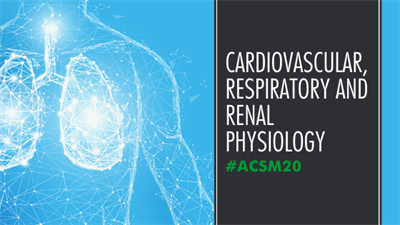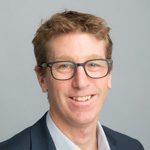William Sheel, Ph.D., FACSM |
Feb.
3, 2020
 As the topical representative for Cardiovascular, Respiratory and Renal Physiology I am pleased to share some exciting scientific program details with attendees of the 2020 ACSM Annual Meeting. I draw your attention to three specific sessions.
As the topical representative for Cardiovascular, Respiratory and Renal Physiology I am pleased to share some exciting scientific program details with attendees of the 2020 ACSM Annual Meeting. I draw your attention to three specific sessions.
First, the highlighted symposium is titled “Understanding Breathlessness During Exercise: Mechanisms and Consequences.” The session will take place on Thursday, May 28 at 3:45 p.m. “Breathlessness” is an important reason some people avoid exercise, yet despite this the mechanistic basis and functional importance of breathless remain incomplete. Outstanding presenters interested in respiratory physiology and breathlessness for this session include: Michael Stickland, Ph.D., University of Alberta, Dennis Jensen, Ph.D., McGill University, Dharini Bhammar, Ph.D., University of Nevada, Las Vegas and Paolo Dominelli, Ph.D., University of Waterloo. Specific topics will include 1) how the neural drive to breathe and lung mechanics interact to contribute to dyspnea during exercise, 2) how obesity and the pulmonary circulation can contribute to dyspnea, and 3) how sex differences may contribute to breathlessness and divergent respiratory responses to exercise.
The second session is titled “Cardiac Function - Beyond Cardiac Output and VO2max,” to be presented on Thursday, May 28 at 9:30 a.m. It has long been known that maximal human performance depends, in part, on maximal cardiac output. Chronic exercise training is known to elicit cardiac adaptation, often termed the “athlete’s heart,” and is thought to facilitate the greater demand and capacity during exercise. Recent evidence suggests that the heart is limited in its adaptation and its ability to provide the “correct” amount of blood flow to some organs, including skeletal muscle and the lungs. This symposium brings together some of the most eminent experts in exercise cardiology, who aim to highlight 1) the limited adaptation of the aging heart, presented by Erin Howden, Ph.D. of the Baker Heart and Diabetes Institute; 2) the disproportionate stress of the right ventricle during exercise discussed by Andre LaGerche, M.D. of the Baker Heart and Diabetes Institute; 3) the large capacity of arteries presented by Maureen MacDonald, Ph.D., McMaster University; 4) the importance of skeletal muscle discussed by Mark Haykowsky, Ph.D., of the University of Texas Arlington; 5) the limited VO2max in heart failure patients delivered by William Cornwell, Ph.D., University of Colorado; and 6) the uncoupling of cardiac contraction/relaxation and output/filling presented by Eric Stöhr, Ph.D. of the Columbia University Irving Medical Center and Cardiff Metropolitan University. The session will be co-chaired by Benjamin Levine, M.D., FACSM, of the Institute for Exercise and Environmental Medicine Texas Health Presbyterian Hospital and UT Southwestern, and Dr. Stöhr.
Third, a tutorial session will be co-presented by Troy Cross, Ph.D., of the Mayo Clinic and Joseph Duke, Ph.D., Northern Arizona University. The tutorial is titled “Assessment of Respiratory Muscle Work: Tools for Success.” Measuring respiratory muscle work not only provides deep mechanistic insights into the energetics of whole-body exercise, but may also inform us on the mechanical constraints imposed by our respiratory system on our capacity to perform physical activity in health and disease (i.e., COPD, Heart Failure, etc.). Despite its utility, the measurement of the work/power of breathing is performed by only a small number of laboratories around the world. Therefore, the principal theme of this session is to communicate the theory and practical aspects of measuring the work and power of breathing during exercise in a clear and tractable manner. Attendees will acquire the skills/theory necessary to begin making such measurements in their laboratories. This session will be presented on Thursday, May 28 at 1:30 p.m.
Other excellent symposia, free communications and posters will also be presented at the Annual Meeting. For information on these sessions and to begin building your scientific itinerary please see the program.
Ready to join us in San Francisco? Register for the 2020 Annual Meeting.
 William Sheel, Ph.D., FACSM, is a professor in the School of Kinesiology at the University of British Columbia, Vancouver, Canada.
William Sheel, Ph.D., FACSM, is a professor in the School of Kinesiology at the University of British Columbia, Vancouver, Canada.